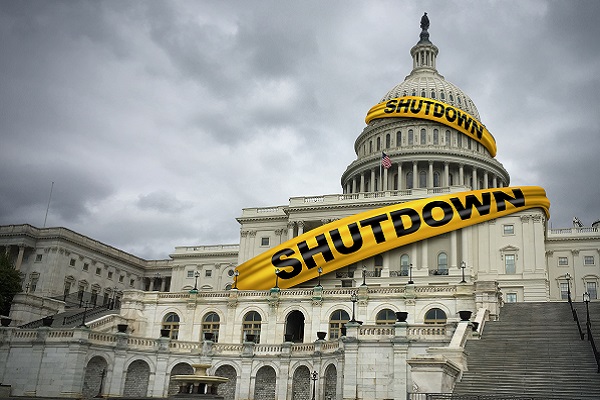
On October 1, 2023, a potential government shutdown was averted thanks to the collaborative efforts of then-Speaker Kevin McCarthy and Senate Majority Leader Chuck Schumer. They crafted a short-term bill that grants the government an extension until November 17, 2023.
However, with the deadline fast approaching, the odds of a November government shutdown stand at approximately 30 percent, as reported by Kalshi, an event trading site. Congress needs to promptly approve a continuing resolution or other budgetary measures to avert a shutdown.
Government shutdowns have far-reaching consequences, impacting innocent citizens, businesses, and even the relocation plans of employees and their employers.
How Government Shutdowns Affect Mobility for Employees & Employers
Immigration
Government shutdowns create uncertainty in the immigration process, which can be frustrating and stressful for visa applicants. During a shutdown, federal agencies such as the Department of Labor and the Department of State may experience disruptions or delays. This disruption can affect the timely processing of visa applications, leading to longer wait times for approvals, interviews, or other necessary steps in the visa application process. Passport operations can also be affected.
Some visa categories, such as H-1B visas for skilled workers, may require specific employment conditions and deadlines. A government shutdown could disrupt an immigrant’s ability to start or continue U.S. employment.
Employment Verification
A shutdown can hinder employment verification processes, particularly regarding Form I-9, which verifies the employment eligibility of individuals. Employers are still generally required to complete Form I-9 for new hires within the required time limit, even during a government shutdown. Failure to do so can result in legal consequences, so employers may need to adapt their processes to allow for processing delays.
The Department of Homeland Security (DHS) operates an online system, E-Verify, which many employers use to confirm employment eligibility. During a government shutdown, the availability and functionality of the E-Verify system may be affected. These interruptions can lead to delays in verifying new hires’ work authorization and may disrupt the onboarding process for employers. HR professionals should be aware of the status of the E-Verify system and consider alternative procedures for verifying employees’ work authorization when the system is unavailable.
Many federal agencies involved in immigration and employment verification, such as U.S. Citizenship and Immigration Services (USCIS) and the Social Security Administration, may experience delays in processing applications for work authorization documents, such as Employment Authorization Documents (EADs). These delays can impact individuals who rely on these documents for employment.
Other Areas Impacting Mobility
Along with employment verification and immigration, there are other potential impacts of a shutdown that human resources and relocation professionals should be aware of so that they can plan and communicate effectively:
- Taxes and Social Security
Human resources professionals must know how a government shutdown may impact taxes and Social Security to ensure that employees are adequately informed and that payroll and tax-related processes are managed effectively.
During a government shutdown, the Internal Revenue Service (IRS) may still accept and process tax returns, but there could be delays in responding to inquiries, processing refunds, and issuing transcripts. HR professionals should monitor IRS updates and communicate any changes in tax filing deadlines or procedures to employees.
The collection and processing of payroll taxes, including federal income tax and FICA (Social Security and Medicare) deductions, may continue during a government shutdown. Employers should ensure that payroll processes are not disrupted and accurately report and remit their employees’ tax withholdings to the appropriate agencies.
A government shutdown may impact certain tax credits and deductions. HR professionals should stay informed about any changes to tax law or credits that may affect employees, such as the Earned Income Tax Credit (EITC) or the Child Tax Credit.
- Mortgage Originations
Not all mortgage origination processes are equally impacted by government shutdowns, and the extent of the disruption can vary based on the specific circumstances of the shutdown. Government agencies such as the Federal Housing Administration (FHA), the Department of Veterans Affairs (V.A.), and the U.S. Department of Agriculture (USDA) play a significant role in insuring or guaranteeing certain mortgage loans. During a government shutdown, these agencies may have reduced staff or limited services, leading to delays in the approval of FHA, VA, and USDA loans. Relocating employees who rely on these programs may experience delays in getting their mortgages approved.
Mortgage lenders must verify a borrower’s income and employment as part of the underwriting process. Government shutdowns can disrupt the verification process, especially if the shutdown leads to a lack of access to tax transcripts or employment verification services.
- U.S. Travel Economy
Although air travel should not be affected, a lengthy shutdown could lead to TSA furloughs, potentially impacting airport operations. Eventually, airlines would cancel flights if there were not enough personnel to process the passengers through security.
Preparing for the Impact of a Government Shutdown
Companies that relocate employees, and those employees and their families, can face challenging situations when a shutdown is impending or underway. It’s crucial for employers and employees to stay updated on the status of government operations and heed guidance from relevant agencies during such times. By being thoroughly prepared, companies and their employees can effectively respond to what may otherwise be a disruptive period.




